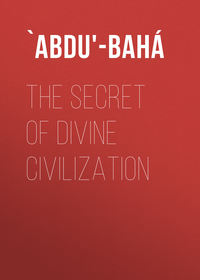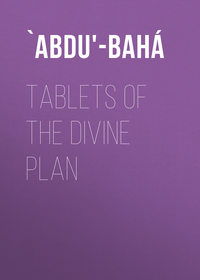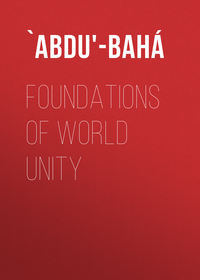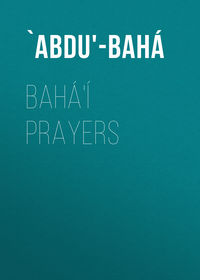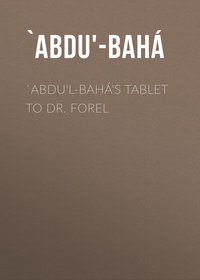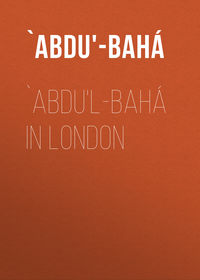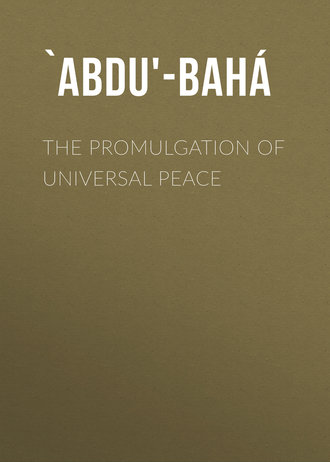 полная версия
полная версияThe Promulgation of Universal Peace
The third teaching or principle of Bahá’u’lláh is that religion and science are in complete agreement. Every religion which is not in accordance with established science is superstition. Religion must be reasonable. If it does not square with reason, it is superstition and without foundation. It is like a mirage, which deceives man by leading him to think it is a body of water. God has endowed man with reason that he may perceive what is true. If we insist that such and such a subject is not to be reasoned out and tested according to the established logical modes of the intellect, what is the use of the reason which God has given man? The eye is the organ of sense by which we view the world of outer phenomena; hearing is the faculty for distinguishing sounds; taste senses the properties of objects, such as bitter, sweet; smell detects and differentiates odors; touch reveals attributes of matter and perfects our communication with the outer world; yet after all, the circle and range of perception by the five senses is exceedingly limited. But the intellectual faculty of man is unlimited in its sphere of action. The eye views details perhaps a mile, but the intellect can perceive the far East and West. The ear may hear tone modulations at one thousand feet, but the mind of man can detect the harmonies of the heavenly spheres as they swing in their courses. Mind makes geological discoveries in subterranean depths and determines the processes of creation in the earth’s lowest strata. The sciences and arts, all inventions, crafts, trades and their products have come forth from the intellect of man. It is evident that within the human organism the intellect occupies the supreme station. Therefore, if religious belief, principle or creed is not in accordance with the intellect and the power of reason, it is surely superstition.
At another time I shall speak further of the principles revealed in the teachings of Bahá’u’lláh.
TALKS ‘ABDU’L-BAHÁ DELIVERED IN CHICAGO, WILMETTE, AND EVANSTON
30 April 1912
Talk at Public Meeting Concluding Convention of Bahá’í Temple Unity
Drill Hall, Masonic Temple, Chicago, Illinois
Notes by Joseph H. HannenAmong the institutes of the Holy Books is that of the foundation of places of worship. That is to say, an edifice or temple is to be built in order that humanity might find a place of meeting, and this is to be conducive to unity and fellowship among them. The real temple is the very Word of God; for to it all humanity must turn, and it is the center of unity for all mankind. It is the collective center, the cause of accord and communion of hearts, the sign of the solidarity of the human race, the source of eternal life. Temples are the symbols of the divine uniting force so that when the people gather there in the House of God they may recall the fact that the law has been revealed for them and that the law is to unite them. They will realize that just as this temple was founded for the unification of mankind, the law preceding and creating it came forth in the manifest Word. Jesus Christ, addressing Peter, said, “Thou art Peter, and upon this rock I will build my church.” This utterance was indicative of the faith of Peter, signifying: This faith of thine, O Peter, is the very cause and message of unity to the nations; it shall be the bond of union between the hearts of men and the foundation of the oneness of the world of humanity. In brief, the original purpose of temples and houses of worship is simply that of unity—places of meeting where various peoples, different races and souls of every capacity may come together in order that love and agreement should be manifest between them. That is why Bahá’u’lláh has commanded that a place of worship be built for all the religionists of the world; that all religions, races and sects may come together within its universal shelter; that the proclamation of the oneness of mankind shall go forth from its open courts of holiness—the announcement that humanity is the servant of God and that all are submerged in the ocean of His mercy. It is the Mashriqu’l-Adhkár. The world of existence may be likened to this temple and place of worship. For just as the external world is a place where the people of all races and colors, varying faiths, denominations and conditions come together—just as they are submerged in the same sea of divine favors—so, likewise, all may meet under the dome of the Mashriqu’l-Adhkár and adore the one God in the same spirit of truth; for the ages of darkness have passed away, and the century of light has come. Ignorant prejudices are being dispelled, and the light of unity is shining. The differences existing between nations and peoples will soon be annulled, and the fundamentals of the divine religions, which are no other than the oneness and solidarity of the human race, are being established. For thousands of years the human race has been at war. It is enough. Now let mankind, for a time at least, consort in amity and peace. Enmity and hatred have ruled. Let the world, for a period, exercise love. For thousands of years the nations have denied each other, considering each other as infidel and inferior. It is sufficient. We must now realize that we are the servants of one God, that we turn to one beneficent Father, live under one divine law, seek one reality and have one desire. Thus may we live in the utmost friendship and love, and in return the favors and bounties of God shall surround us; the world of humanity will be reformed; mankind, enjoy a new life; eternal light will illumine, and heavenly moralities become manifest.
Then divine policy shall govern the world, for the divine policy is the oneness of humanity. God is just and kind to all. He considers all as His servants. He excludes none, and His judgments are correct and true. No matter how complete human policy and foresight may appear, they are imperfect. If we do not seek the counsel of God or if we refuse to follow His dictates, it is presumptive evidence that we are knowing and wise, whereas God is ignorant; that we are sagacious and God is not. God forbid! We seek shelter in His mercy for this suggestion! No matter how far the human intelligence may advance, it is still but a drop, while divine omniscience is the ocean. Shall we say that a drop is imbued or endowed with qualities of which the ocean is devoid? Shall we believe that the policy and plan of this atom of a human soul are superior to the wisdom of the Omniscient? There is no greater ignorance than this. Briefly, some are mere children; with the utmost love we must educate them to make them wise. Others are sick and ailing; we must tenderly treat them until they recover. Some have unworthy morals; we must train them toward the standard of true morality. Other than this we are all the servants of one God and under the providence and protection of one Father.
These are the institutions of God and the foundations of His temple, the Mashriqu’l-Adhkár. The outer edifice is a symbol of the inner. May the people be admonished thereby.
I pray in your behalf that your hearts may be enlightened with the light of the love of God; that your minds may develop daily; that your spirits may become aglow with the fire and illumination of His glad tidings, until these divine foundations may become established throughout the human world. The first of these institutions and foundations is the oneness of humanity and love among mankind. The second is the Most Great Peace. Praise be to God! This American democracy manifests capacity, showing forth readiness to become the standard-bearer of the Most Great Peace. May its hosts be the hosts of the oneness of humanity. May they serve the threshold of God and spread the message of the good pleasure of God.
O Thou kind Lord! This gathering is turning to Thee. These hearts are radiant with Thy love. These minds and spirits are exhilarated by the message of Thy glad tidings. O God! Let this American democracy become glorious in spiritual degrees even as it has aspired to material degrees, and render this just government victorious. Confirm this revered nation to upraise the standard of the oneness of humanity, to promulgate the Most Great Peace, to become thereby most glorious and praiseworthy among all the nations of the world. O God! This American nation is worthy of Thy favors and is deserving of Thy mercy. Make it precious and near to Thee through Thy bounty and bestowal.
30 April 1912
Talk at Hull House
Chicago, Illinois
Notes by Joseph H. HannenWhen we view the world of creation, we find that all living things may be classified under two aspects of existence. First, they possess bodies composed of material substance common to all—whether vegetable, animal or human. This is their point of agreement or, as it is philosophically termed, their point of contact. Second, they vary and differ from each other in degree and function—that is to say, in their respective kingdoms. This is their point of distinction and differentiation. For instance, the vegetable and animal are alike in the fact that their bodies are composed of the same material elements but widely different in their kingdoms and powers. Man is like the animal in physical structure but otherwise immeasurably separated and superior.
In the human kingdom itself there are points of contact, properties common to all mankind; likewise, there are points of distinction which separate race from race, individual from individual. If the points of contact, which are the common properties of humanity, overcome the peculiar points of distinction, unity is assured. On the other hand, if the points of differentiation overcome the points of agreement, disunion and weakness result. One of the important questions which affect the unity and the solidarity of mankind is the fellowship and equality of the white and colored races. Between these two races certain points of agreement and points of distinction exist which warrant just and mutual consideration. The points of contact are many; for in the material or physical plane of being, both are constituted alike and exist under the same law of growth and bodily development. Furthermore, both live and move in the plane of the senses and are endowed with human intelligence. There are many other mutual qualifications. In this country, the United States of America, patriotism is common to both races; all have equal rights to citizenship, speak one language, receive the blessings of the same civilization, and follow the precepts of the same religion. In fact numerous points of partnership and agreement exist between the two races; whereas the one point of distinction is that of color. Shall this, the least of all distinctions, be allowed to separate you as races and individuals? In physical bodies, in the law of growth, in sense endowment, intelligence, patriotism, language, citizenship, civilization and religion you are one and the same. A single point of distinction exists—that of racial color. God is not pleased with—neither should any reasonable or intelligent man be willing to recognize—inequality in the races because of this distinction.
But there is need of a superior power to overcome human prejudices, a power which nothing in the world of mankind can withstand and which will overshadow the effect of all other forces at work in human conditions. That irresistible power is the love of God. It is my hope and prayer that it may destroy the prejudice of this one point of distinction between you and unite you all permanently under its hallowed protection. Bahá’u’lláh has proclaimed the oneness of the world of humanity. He has caused various nations and divergent creeds to unite. He has declared that difference of race and color is like the variegated beauty of flowers in a garden. If you enter a garden, you will see yellow, white, blue, red flowers in profusion and beauty—each radiant within itself and although different from the others, lending its own charm to them. Racial difference in the human kingdom is similar. If all the flowers in a garden were of the same color, the effect would be monotonous and wearying to the eye.
Therefore, Bahá’u’lláh hath said that the various races of humankind lend a composite harmony and beauty of color to the whole. Let all associate, therefore, in this great human garden even as flowers grow and blend together side by side without discord or disagreement between them.
30 April 1912
Talk at Fourth Annual Conference of the National Association for the Advancement of Colored People
Handel Hall, Chicago, Illinois
Notes by Joseph H. HannenAccording to the words of the Old Testament God has said, “Let us make man in our image, after our likeness.” This indicates that man is of the image and likeness of God—that is to say, the perfections of God, the divine virtues, are reflected or revealed in the human reality. Just as the light and effulgence of the sun when cast upon a polished mirror are reflected fully, gloriously, so, likewise, the qualities and attributes of Divinity are radiated from the depths of a pure human heart. This is an evidence that man is the most noble of God’s creatures.
Each kingdom of creation is endowed with its necessary complement of attributes and powers. The mineral possesses inherent virtues of its own kingdom in the scale of existence. The vegetable possesses the qualities of the mineral plus an augmentative virtue, or power of growth. The animal is endowed with the virtues of both the mineral and vegetable plane plus the power of intellect. The human kingdom is replete with the perfections of all the kingdoms below it with the addition of powers peculiar to man alone. Man is, therefore, superior to all the creatures below him, the loftiest and most glorious being of creation. Man is the microcosm; and the infinite universe, the macrocosm. The mysteries of the greater world, or macrocosm, are expressed or revealed in the lesser world, the microcosm. The tree, so to speak, is the greater world, and the seed in its relation to the tree is the lesser world. But the whole of the great tree is potentially latent and hidden in the little seed. When this seed is planted and cultivated, the tree is revealed. Likewise, the greater world, the macrocosm, is latent and miniatured in the lesser world, or microcosm, of man. This constitutes the universality or perfection of virtues potential in mankind. Therefore, it is said that man has been created in the image and likeness of God.
Let us now discover more specifically how he is the image and likeness of God and what is the standard or criterion by which he can be measured and estimated. This standard can be no other than the divine virtues which are revealed in him. Therefore, every man imbued with divine qualities, who reflects heavenly moralities and perfections, who is the expression of ideal and praiseworthy attributes, is, verily, in the image and likeness of God. If a man possesses wealth, can we call him an image and likeness of God? Or is human honor and notoriety the criterion of divine nearness? Can we apply the test of racial color and say that man of a certain hue—white, black, brown, yellow, red—is the true image of his Creator? We must conclude that color is not the standard and estimate of judgment and that it is of no importance, for color is accidental in nature. The spirit and intelligence of man is essential, and that is the manifestation of divine virtues, the merciful bestowals of God, the eternal life and baptism through the Holy Spirit. Therefore, be it known that color or race is of no importance. He who is the image and likeness of God, who is the manifestation of the bestowals of God, is acceptable at the threshold of God—whether his color be white, black or brown; it matters not. Man is not man simply because of bodily attributes. The standard of divine measure and judgment is his intelligence and spirit.
Therefore, let this be the only criterion and estimate, for this is the image and likeness of God. A man’s heart may be pure and white though his outer skin be black; or his heart be dark and sinful though his racial color is white. The character and purity of the heart is of all importance. The heart illumined by the light of God is nearest and dearest to God, and inasmuch as God has endowed man with such favor that he is called the image of God, this is truly a supreme perfection of attainment, a divine station which is not to be sacrificed by the mere accident of color.
1 May 1912
Talk at Dedication of the Mashriqu’l-Adhkár Grounds
Wilmette, Illinois
Notes by Joseph H. HannenThe power which has gathered you here today notwithstanding the cold and windy weather is, indeed, mighty and wonderful. It is the power of God, the divine favor of Bahá’u’lláh which has drawn you together. We praise God that through His constraining love human souls are assembled and associated in this way.
Thousands of Mashriqu’l-Adhkárs, dawning points of praise and mention of God for all religionists will be built in the East and in the West, but this, being the first one erected in the Occident, has great importance. In the future there will be many here and elsewhere—in Asia, Europe, even in Africa, New Zealand and Australia—but this edifice in Chicago is of especial significance. It has the same importance as the Mashriqu’l-Adhkár in Ishqábád, Caucasus, Russia, the first one built there. In Persia there are many; some are houses which have been utilized for the purpose, others are homes entirely devoted to the divine Cause, and in some places temporary structures have been erected. In all the cities of Persia there are Mashriqu’l-Adhkárs, but the great dawning point was founded in Ishqábád. It possesses superlative importance because it was the first Mashriqu’l-Adhkár built. All the Bahá’í friends agreed and contributed their utmost assistance and effort. The Afnán devoted his wealth, gave all he had to it. From such a mighty and combined effort a beautiful edifice arose. Notwithstanding their contributions to that building, they have assisted the fund here in Chicago as well. The Mashriqu’l-Adhkár in Ishqábád is almost completed. It is centrally located, nine avenues leading into it, nine gardens, nine fountains; all the arrangement and construction is according to the principle and proportion of the number nine. It is like a beautiful bouquet. Imagine a very lofty, imposing edifice surrounded completely by gardens of variegated flowers, with nine avenues leading through them, nine fountains and pools of water. Such is its matchless, beautiful design. Now they are building a hospital, a school for orphans, a home for cripples, a hospice and a large dispensary. God willing, when it is fully completed, it will be a paradise.
I hope the Mashriqu’l-Adhkár in Chicago will be like this. Endeavor to have the grounds circular in shape. If possible, adjust and exchange the plots in order to make the dimensions and boundaries circular. The Mashriqu’l-Adhkár cannot be triangular in shape. It must be in the form of a circle.
2 May 1912
Talk at Hotel Plaza
Chicago, Illinois
Notes by Joseph H. HannenIn this Cause consultation is of vital importance, but spiritual conference and not the mere voicing of personal views is intended. In France I was present at a session of the senate, but the experience was not impressive. Parliamentary procedure should have for its object the attainment of the light of truth upon questions presented and not furnish a battleground for opposition and self-opinion. Antagonism and contradiction are unfortunate and always destructive to truth. In the parliamentary meeting mentioned, altercation and useless quibbling were frequent; the result, mostly confusion and turmoil; even in one instance a physical encounter took place between two members. It was not consultation but comedy.
The purpose is to emphasize the statement that consultation must have for its object the investigation of truth. He who expresses an opinion should not voice it as correct and right but set it forth as a contribution to the consensus of opinion, for the light of reality becomes apparent when two opinions coincide. A spark is produced when flint and steel come together. Man should weigh his opinions with the utmost serenity, calmness and composure. Before expressing his own views he should carefully consider the views already advanced by others. If he finds that a previously expressed opinion is more true and worthy, he should accept it immediately and not willfully hold to an opinion of his own. By this excellent method he endeavors to arrive at unity and truth. Opposition and division are deplorable. It is better then to have the opinion of a wise, sagacious man; otherwise, contradiction and altercation, in which varied and divergent views are presented, will make it necessary for a judicial body to render decision upon the question. Even a majority opinion or consensus may be incorrect. A thousand people may hold to one view and be mistaken, whereas one sagacious person may be right. Therefore, true consultation is spiritual conference in the attitude and atmosphere of love. Members must love each other in the spirit of fellowship in order that good results may be forthcoming. Love and fellowship are the foundation.
The most memorable instance of spiritual consultation was the meeting of the disciples of Jesus Christ upon the mount after His ascension. They said, “Jesus Christ has been crucified, and we have no longer association and intercourse with Him in His physical body; therefore, we must be loyal and faithful to Him, we must be grateful and appreciate Him, for He has raised us from the dead, He made us wise, He has given us eternal life. What shall we do to be faithful to Him?” And so they held council. One of them said, “We must detach ourselves from the chains and fetters of the world; otherwise, we cannot be faithful.” The others replied, “That is so.” Another said, “Either we must be married and faithful to our wives and children or serve our Lord free from these ties. We cannot be occupied with the care and provision for families and at the same time herald the Kingdom in the wilderness. Therefore, let those who are unmarried remain so, and those who have married provide means of sustenance and comfort for their families and then go forth to spread the message of glad tidings.” There were no dissenting voices; all agreed, saying, “That is right.” A third disciple said, “To perform worthy deeds in the Kingdom we must be further self-sacrificing. From now on we should forego ease and bodily comfort, accept every difficulty, forget self and teach the Cause of God.” This found acceptance and approval by all the others. Finally a fourth disciple said, “There is still another aspect to our faith and unity. For Jesus’ sake we shall be beaten, imprisoned and exiled. They may kill us. Let us receive this lesson now. Let us realize and resolve that though we are beaten, banished, cursed, spat upon and led forth to be killed, we shall accept all this joyfully, loving those who hate and wound us.” All the disciples replied, “Surely we will—it is agreed; this is right.” Then they descended from the summit of the mountain, and each went forth in a different direction upon his divine mission.
This was true consultation. This was spiritual consultation and not the mere voicing of personal views in parliamentary opposition and debate.
2 May 1912
Talk to Federation of Women’s Clubs
Hotel La Salle, Chicago, Illinois
Notes by Joseph H. HannenOne of the functions of the sun is to quicken and reveal the hidden realities of the kingdoms of existence. Through the light and heat of the great central luminary, all that is potential in the earth is awakened and comes forth into the realm of the visible. The fruit hidden in the tree appears upon its branches in response to the power of the sun; man and all other organisms live, move and have their being under its developing rays; nature is resplendent with countless evolutionary forms through its pervading impulse—so that we can say a function of the sun is the revelation of the mysteries and creative purposes hidden within the phenomenal world.
The outer sun is a sign or symbol of the inner and ideal Sun of Truth, the Word of God. Inasmuch as this is the century of light, it is evident that the Sun of Reality, the Word, has revealed itself to all humankind. One of the potentialities hidden in the realm of humanity was the capability or capacity of womanhood. Through the effulgent rays of divine illumination the capacity of woman has become so awakened and manifest in this age that equality of man and woman is an established fact. In past ages woman was wronged and oppressed. This was especially the case in Asia and Africa. In certain parts of Asia women were not considered as members of humankind. They were looked upon as inferior, unworthy creatures, subordinate and subject to man. A certain people known as the Nusayris held to the belief for a long period that woman was the incarnation of the evil spirit, or Satan, and that man alone was the manifestation of God, the Merciful. At last this century of light dawned, the realities shone forth, and the mysteries long hidden from human vision were revealed. Among these revealed realities was the great principle of the equality of man and woman, which is now finding recognition throughout the whole world—America, Europe and the Orient.


